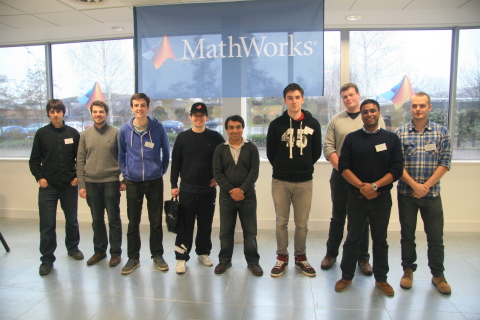Mar 18 2013
MathWorks today hosted a Student Robot Challenge at its new offices in Cambridge. Nine teams from the University of Cambridge participated in the contest, including students from engineering, science and maths disciplines. The challenge was to program a robot that could complete a navigational task using MATLAB and Simulink, applying theory and skills learned in the classroom to the real world.
 Winning teams from the MathWorks Student Robot Challenge with Sham Ahmed, managing director of MathWorks UK (Photo: Business Wire)
Winning teams from the MathWorks Student Robot Challenge with Sham Ahmed, managing director of MathWorks UK (Photo: Business Wire)
With growing calls from the UK’s engineering and technology industries to encourage more STEM students to learn hands-on programming skills and to leave university better prepared to solve real world engineering problems, this robot contest was a fun example of how MathWorks, together with University of Cambridge students, are teaming up to help enhance the academic experience.
- The winners of the MathWorks Simulink Robot Challenge were Team MatLads, whose members were Wesley Wroe and Richard Peach from the Engineering Department
- In second place were QED-grad, whose members were Mark Varley, Henry Cathcart, Oliver Armitage and Emil Hewage
- In third place were Team CCA, whose members were Laird Hocking, Tom Begley, Parousia Rockstroh and Henry Jackson
Each member of the first placed team was awarded a Google Nexus 7. Prizes were also awarded to the second and third placed teams. The judging was carried out by an experienced team of MathWorks engineers who awarded points for correctly completing a series of navigational tasks within the set time.
Professor Jan Maciejowski, Head of the Information Engineering Division at the University of Cambridge, said, “The MathWorks Simulink Robot Challenge is a great example of how we’re working with industry to help prepare students effectively for their future careers. Integrating industry standard tools such as MATLAB and Simulink and teaching skills such as Model-Based Design as part of the STEM curricula is essential. Project-based learning exercises such as this contest, which used LEGO MINDSTORMS NXT, offer opportunities to develop skills by encouraging imagination, creativity and problem-solving in real world situations.”
Jakub Sanak, an engineering student and a member of the team Duplo, said, “This contest helped to make theory come to life. We had a lot of fun today and we hope this type of contest can be an inspiration for other universities, colleges and schools to take part in more project-based challenges. I’ve learned skills today that not only can be applied in my university course, but will also help me in my future career.”
Tanya Morton, Application Engineering Manager at MathWorks, said, “There’s a major push to get more students in the UK interested in STEM subjects to help support the growth of the UK’s engineering and technology industries. By using industry-standard tools such as MATLAB and Simulink to program a robotic system, students get valuable hands-on experience and a taste of the challenges they may face in a career in industry.”